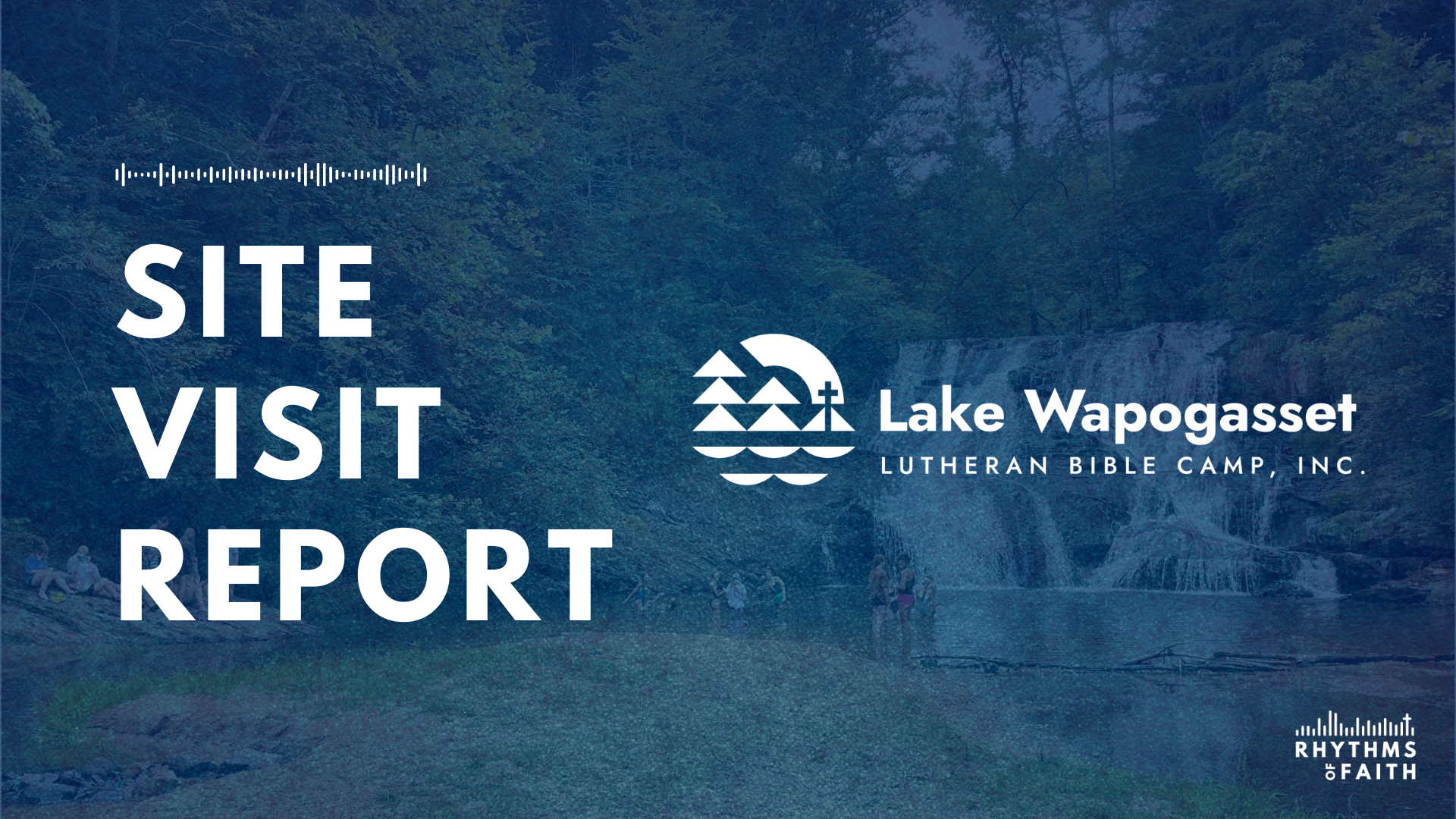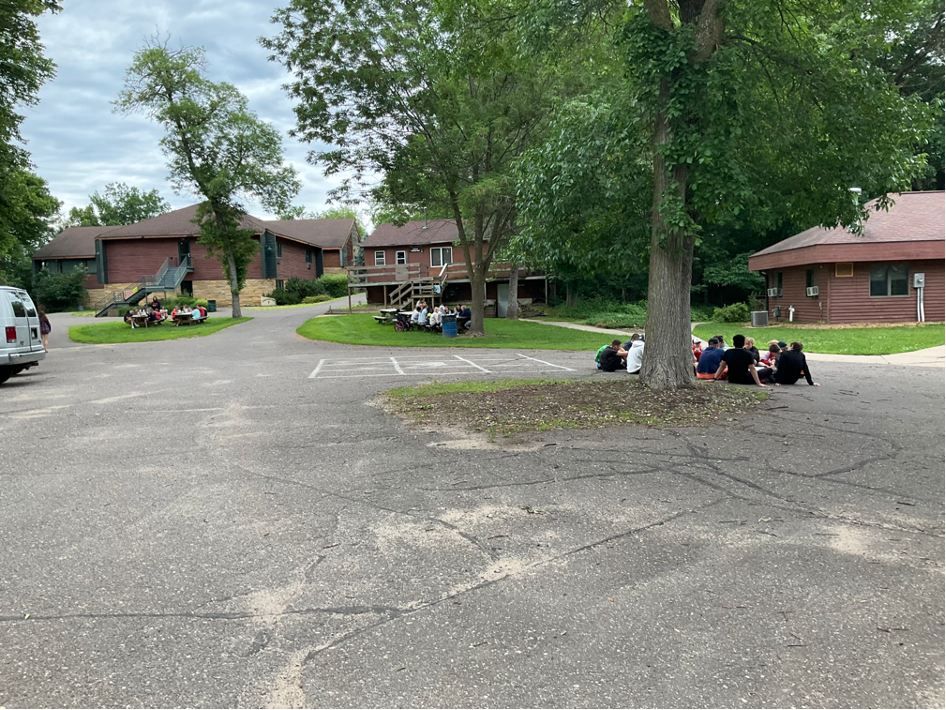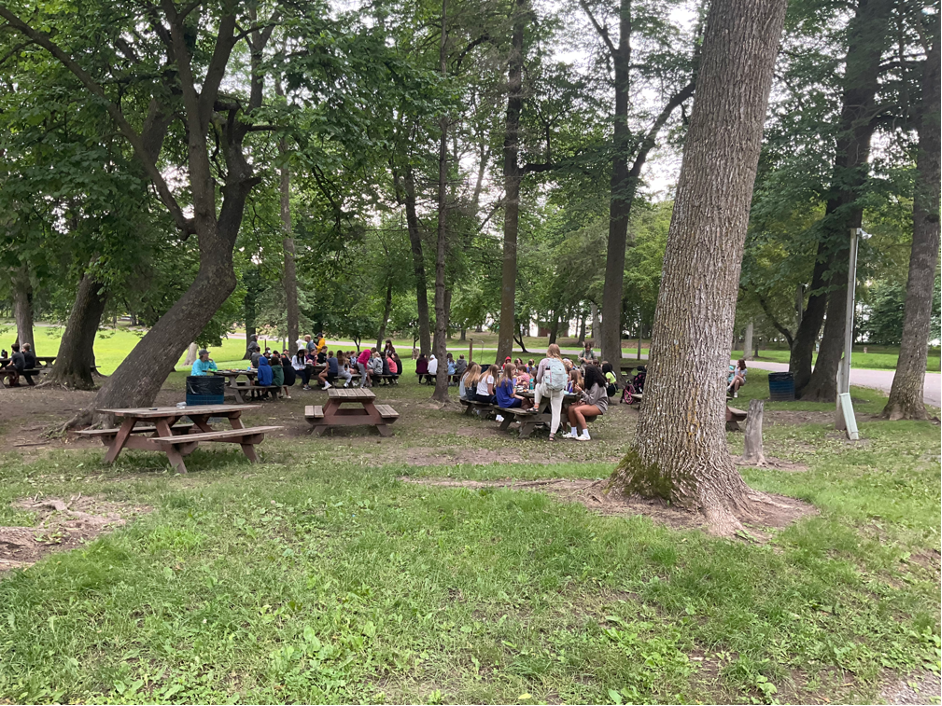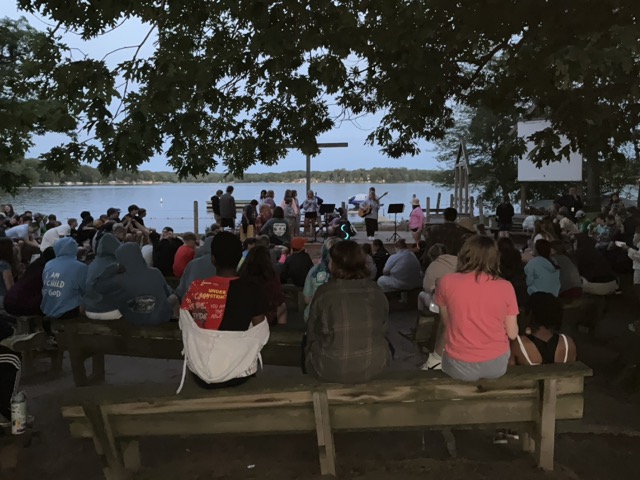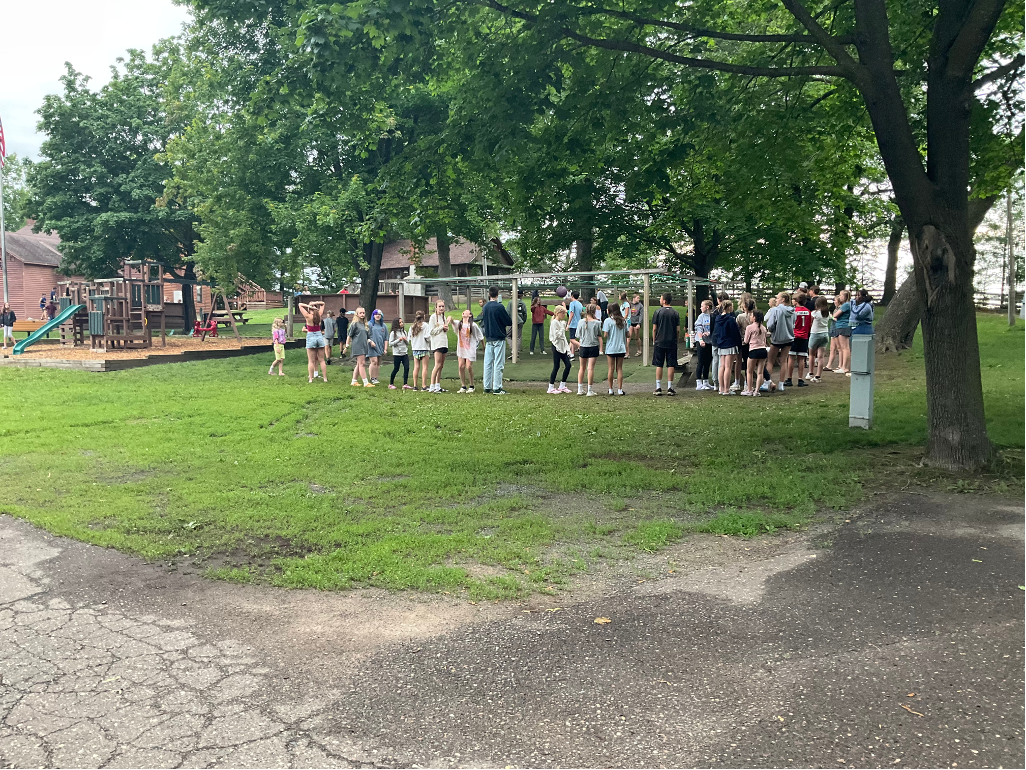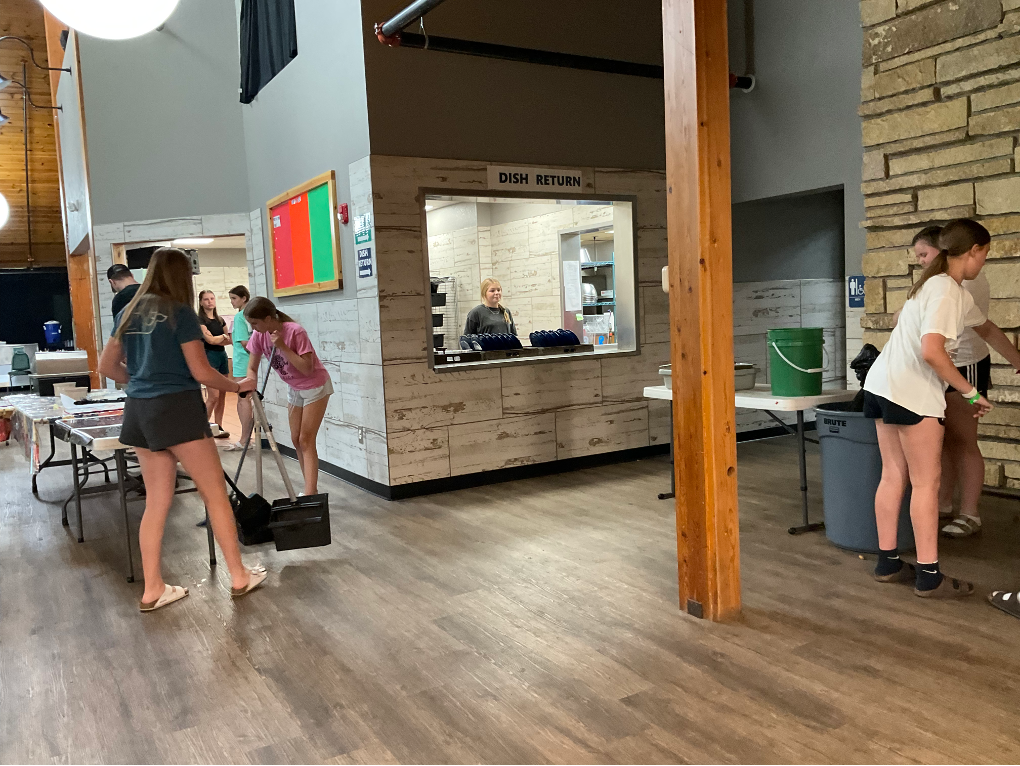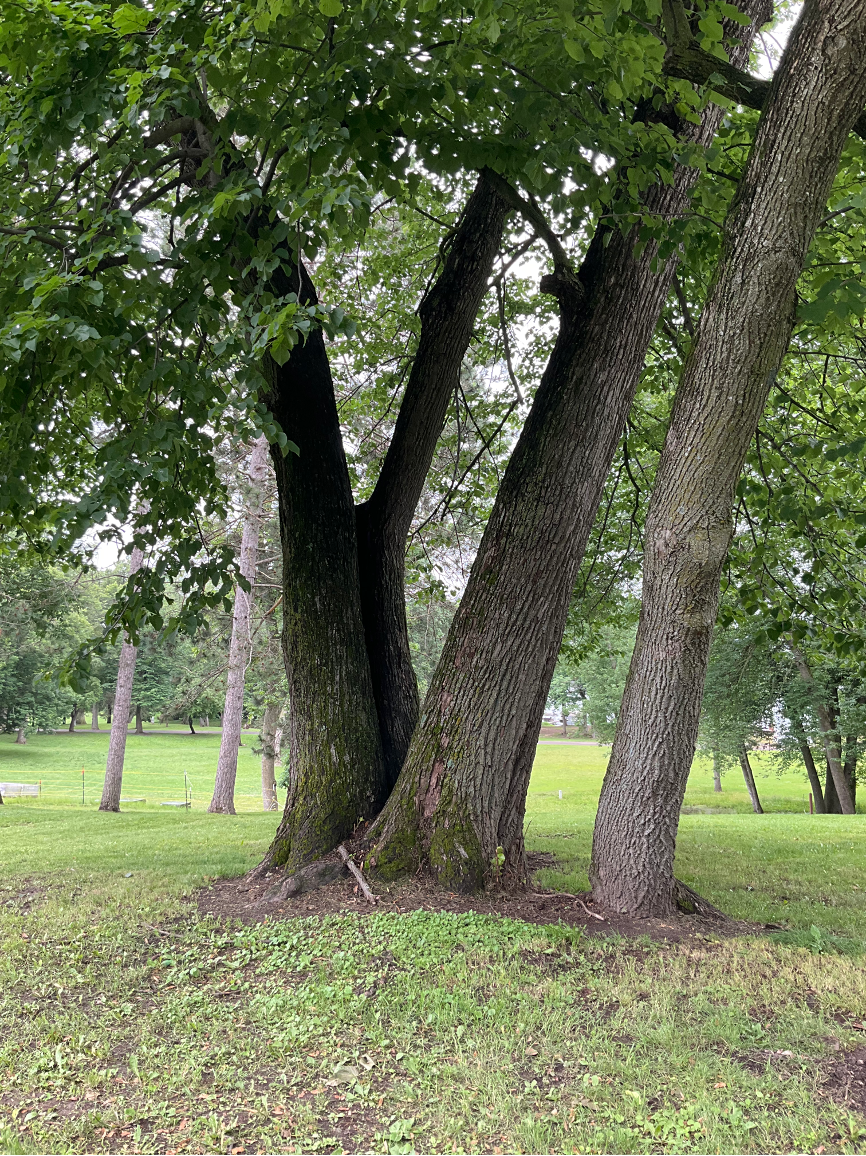Welcome to Wapo
I arrived at Lake Wapogasset Lutheran Bible Camp at around 4:00 PM on June 19 after a long drive through the mixed fields and forests of Wisconsin. Turning onto 74th Avenue between two large signs took me down a lakeside road of lavish summer homes. I could see the lake between them. After about a mile, I turned right under an old ranch sign holder of days gone by. I wondered, “Am I here?” Seconds later, the labeled office welcomed me to a place set apart. Wapo, as it is affectionately called, is located on a point nestled between Bear Trap and Wapogasset Lakes. It feels like you’ve stepped off the earth onto a secluded island. As you drive the simple circle, the lake, beach, and campfire amphitheater are to your left and the Martin’s Commons Dining Hall towers on the hilltop to the right. I knew camp was in session, but it felt almost empty. Over 200 campers were experiencing free time and were scattered between the swim area, basketball court, air square, and 2 enormous gaga pits. It felt as if I was disappearing from the rat race.
I soon met Suzi, the program director overseeing Wapo’s two Wisconsin facilities for a warm welcome, a name tag, and a tour. My name lanyard said, “Church staff,” signifying that there are enough church staff that come to camp that they get their own identifier. Historic, small home-like cabins were scattered across the hilltop in the midst of large deciduous trees. It was apparent these buildings had served a long healthy life and had many stories to tell. A significant drop-off of 100 feet had a fenced off barrier to the Lake Wapogasset side of the facility. Two large newer conference center type buildings were at the end of the tour and had great meeting rooms that seemed like they were in the top of the trees through the windows behind the stage. What an awesome place to worship, learn and fellowship…as I would soon find out. I was struck by the flexibility of their housing units, that could house families or retreat guests in cozy rooms for 8 but by opening a door could be a summer camper cabin for 14 with 2 counselors. All cabins but four had intact bathrooms.
Wapo has a compelling progression of camper programs that all link with a growing plant. Seeds is a weekend program for first through third graders that has its own high school staff. This is followed by Sprouts, Branches, Vines, and Roots (for early high school students). A high school leadership program is offered later in the summer at Ox Lake, a more rustic, simple space that is even closer to nature and focused on building deep personal faith. All programs at the main site participate in everything together, and it seems to work. Numbers dwindle at the older ages, with only 7 students in the Roots program this session.
Wapo had a schedule I have not seen in thirty plus years of Christian camping. Weeklong camp goes from Sunday to Friday for campers fourth grade and up. On Friday afternoon, a new weekend staff arrives to welcome the Seeds campers (first through third grade) until Sunday morning. The weeklong staff gets the weekend off. Besides being a great pipeline for both campers and future staff, it provides weeklong staff with 2 days off each week. Some weekends throughout summer, there are family camps in which a combination of these staff groups serve the guests. I wondered how this contributed to the 50% retention Wapo experiences with their staff.
A faith at home conversation
After getting settled in my room I went off to dinner and sat with two visiting pastors. After introducing ourselves, they asked what we are researching. Within minutes, we were engaged in a rich conversation about the role of camp in family and church spiritual formation. Both were from a partner church and each had about 40 campers from their church this session. They’d been here all week. Their goal was to be part of their congregants’ camp experience and get to know them. One works with the junior high and high school youth and especially wanted to get to know the younger kids, who she didn’t get to see much at church. Both were highly impacted by camp as children and young adults and appreciated the role of camp in synod life.
The other pastor had some very interesting perspectives on whether camp impacts faith in the home and church. Though he valued camp for the kids, he wasn’t sure of its impact. This identified for me the need for this project and launched my time at Wapo with our critical question in mind: What are the most promising strategies of overnight Christian summer cam ps to influence faith practices in the home? One thing he highlighted was that he thinks the greatest impact of camp is on the emerging adults who serve as counselors and staff at camp. We wondered together about how serving as camp staff impacted their parenting and future engagement in church life. This conversation was a foreshadowing of the rest of my time.
Get outside & serve
One thing I quickly noticed about Camp Wapo is that they do everything outside. During lunch, campers have the option to take their meals outside to a large cluster of picnic tables, and many did! At every moment of free time, the campers crowd the game areas, as noted above. During Bible study time, cabin groups are scattered across the open spaces and every available picnic table. The facility is small enough that quick changes for the swim area and other activities are easy.
I also noticed that campers are purposefully integrated into service at camp. Each meal, a cabin group is assigned to serve the food and another is assigned to clean up and wash dishes. At evening campfire, campers help lead songs for the community. Before each meal, a cabin group leads a fun, song oriented prayer for the community. Mike, the Ox Lake program director, said that engaging kids in aspects of service and leadership is part of the DNA of Wapo, teaching that they too can contribute to helping camp run.
Camp is faith alive
My focus groups with multi-year teenage male and female camper groups the next morning revealed what they love about Wapo. The strong themes of outdoor fun, deep friendships, engaged counselors, and faith-based worship and conversations were evident. The campers loved being off their technology and the active worship that happened many times a day. One camper joked that they pray at least 20 times a day. All agree that God was real at camp, and they felt free to talk freely about God and their questions. The friends they make here extend throughout the year and are a major support to life at home. They stated that camp helped them with their faith at home but that it was definitely more challenging there given their schedules, the distractions, and the lack of an environment that was fully focused on faith and knowing God. Together, they were able to identify the many program elements I was already noticing were built in to camp life to help them in their faith journey: First word (not talking until they’ve gathered at the dining hall for the first word from scripture), worship (a service that informally but elegantly follows the liturgy), cabin Bible study, evening campfire (a time of worship, skit, and word), and lessons integrated throughout the day in activities (e.g. gaga ball cheating purposefully used to create conversation). It appeared to me that they were getting it.
I was soon to understood why. Later that day, I had a focus group with 7 summer staff members. They had an average of 10 years of experience at Wapo. Many had been counselors for 3-4 years. They were avid camp and Wapo fans. They had come back year after year and spoke passionately about the role camp played in their own faith formation. When asked why they return, they said the strength of the community, impacting the campers, and love of the fun, outdoor, faith-centered focus of camp. It was best summed up by one staff who said, “Camp is faith alive” and another who added, “Here we build relationships that provide the support and reminder of God and his goodness throughout the rest of the year.”
The final morning of camp started with an early staff meeting. Counselors were barely awake and likely had a short night’s sleep. Suzie and camp director Heather affirmed and thanked the staff for a great week. They also invited staff to share highlights from the week. A cool last morning tradition is that counselors serve breakfast to campers in bed. So after the meeting, staff gathered their food on large sheet trays and took it back to the cabins. It was a rainy morning, so the leadership quickly readjusted the parent pick-up plan and closing worship. Staff seemed flexible and willing. A great attitude of service was represented by the team throughout my visit.
Fun, safe, and authentic
As camp ended and parents converged on the site, I was privileged to have a parent focus group meeting and talk to a few parents over lunch. These parents love camp! They see strong connections to their churches and acknowledged the significant empowering impact it has on their children, spiritually, socially and with their identity. One parent spoke of how their kids returning from camp reinvigorated their family faith practices, including involvement in church. Multiple parents spoke to a strength of character that comes from being engaged with camp. The songs the campers sing, the quality of the counselors, and the relationships with other campers were highlights. Parents love that camp is a faith infused environment that is fun, safe, and authentic.
Parents talked about the biggest challenges of parenting right now are technology, social media, and the negativity and division of our world. They see the inability of people to have authentic conversations with each other as a major deficit impacting their children’s lives in many ways. Parents love how camp is a safe place to build their faith, engage with others, be technology free, build confidence and values to face the world. Parents were intrigued by the idea of webinars, retreats, and other ways to help them figure out these challenges. When I asked what were the challenges of being a parent and how can camp help, one immediate mother’s response holding back tears was, “It is really hard.”
I asked the parents about their pastor’s support of camp. All of them said that their church leadership highly valued camp’s role in congregational life. Most churches provided scholarships, required camp as part of confirmation, and sent pastoral staff to camp with the kids. This perspective was affirmed in the focus group meeting I had with pastors later that day.
Seven youth, children, and family pastors (all women) joined me for an hour. Most had meaningful experiences as campers and staff. They were adamant that camp played a critical role in the life of their congregation with many touch points throughout the year. They felt served by camp in many ways but were especially grateful that camp let them come for free when their kids were at camp. It felt like a true partnership. The best summarizing comments came from a pastor who said, “Camp teaches more than just faith and spiritual formation. It is holistic.” Another pastor called it a “strategic partnership.”
From seedlings to deep roots
As I finish my time at Lake Wapogasset Lutheran Bible Camp, I leave with a deep admiration for the culture, the extended Wapo family, the heritage, and the commitment of its leaders and counselors to provide a safe, fun, faith-infused environment for youth to grow from seedlings to strong, large trees with deep roots like those scattered across the property.

